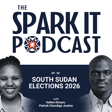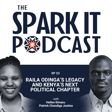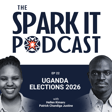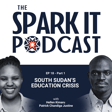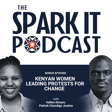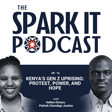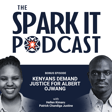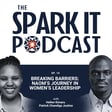Become a Creator today!Start creating today - Share your story with the world!
Start for free
00:00:00
00:00:01

The Spark It Podcast EP 18 Pt. 2: South Sudan’s Education Crisis │Patrick Chandiga Justine
In Part 2 of this Spark It Podcast episode, Patrick Chandiga Justine sheds light on how South Sudan’s education crisis ties directly to peace, politics, and the nation’s future. With millions of children out of school, underpaid teachers, and fragile infrastructure, the system struggles to prepare future leaders. Patrick explains why peace is the foundation for any real reform and highlights efforts like Girls’ Education South Sudan (GESS). He calls for government investment, teacher training, and global support while urging students to keep hope alive. Education, he argues, is not just a right—it’s South Sudan’s greatest resource and pathway to change.
Transcript
Disconnected Politicians and Education Challenges
00:00:11
Speaker
So in that context, um what do you think can be done to help rebuild the education system in South Sudan? Because clearly there so many challenges. What can be done to address these challenges, even if it's like ah slow, progressive growth, you know?
00:00:28
Speaker
ah Maybe even before respond to that, like i just, you know, an addition to what you said with regard to, you know, politicians sending their children away and so forth and how they are out of touch and with with those they ideally serve.
00:00:43
Speaker
I feel like for the case of South Sudan, it's the worst. I feel our politicians are totally and completely out of touch with the way the ordinary South Sudanese whom they have promised and pledged to serve and protect. They're completely out of touch.
00:01:05
Speaker
Yeah, they they are not deliberately, you know, they are not deliberately making efforts to improve the quality of education or to improve the quality ah to improve security in the country, ah to stabilize the country and restore peace.
00:01:23
Speaker
um all All this stuff, they are not making the effort enough. I feel like there's there's there's a lack of political will. with rigor to those issues from the politicians. and And because of that, honestly, ah you know ah whether young South Sudanese leave the country forcefully or willingly, whether ah South Sudanese children leave the country willingly or forcefully, what happens is that education has become like an expert and our students are leaving.
00:02:02
Speaker
And so is their potential. They're living with their potential. And without a stable access to education at home, honestly, we in my opinion, we we risk a brain drain at every level.
00:02:19
Speaker
For sure. That's very true. yeah Because when people leave, they don't come back most of the time. Most of the time they don't. You see? So technically, we are exporting our future to other countries.
00:02:33
Speaker
without the guarantee that those the students will return back to South Sudan, you see, and improve, you know, our country and our well-being and our welfare and stuff like that.
00:02:46
Speaker
Wow. Yeah. That's actually dangerous. It is. It Yeah. And you know, the effects will not be felt right now. Yes. Give you them
Promoting Girls' Education Amid Cultural Barriers
00:02:55
Speaker
like around 10 years.
00:02:57
Speaker
Yes. then Then by the time it's getting to 20 years, it's like really bad. Yes. By 30 years, you don't have a country. Yes. It'll be too late. Yeah, that's true.
00:03:09
Speaker
ah So something has to be done urgently. it It has to be. It has to be, honestly. It has to be. and And I know, like, for example, ah because of some of these issues, including the stats that we looked at, you know, where a huge chunk of children are not in school in South Sudan, the government has, you know, made efforts ah with a program called GESH,
00:03:36
Speaker
girls education such as them. So this, this program, what it does is it's meant to promote a girl child education. And what it does is that it offers cash transfers to, you know, girls.
00:03:50
Speaker
Yeah. ah To encourage them to stay in school and stuff like that. Like an incentive. Yes. ah To keep them in school. And, um, the The program also runs radio campaigns that basically helps sensitize the local communities to be able to send their children to school and to kind of inform them about the value of education for not just the boy child, but the girl child too.
00:04:19
Speaker
So these, these are I think, are good programs, in my opinion, and that we can invest more in and try to see that they reach more people and improve maybe the quality of these programs and maybe assess those that have been running. Because I think they were introduced since when I was there. I don't know if it is currently ongoing.
00:04:40
Speaker
ah There's very limited reports on it. I tried to Google
Investing in Education for Future Leaders
00:04:44
Speaker
online, but I couldn't find so much on it. But i I see this as a program that has a huge impact with rigor to improving access to education, especially ah for girls in South Sudan.
00:05:01
Speaker
Yeah, stuff like that. But of course, we also know there are many cultural g norms that are also holding girls back, even when such kind of programs are instituted.
00:05:12
Speaker
So you're battling against so many odds. Yeah.
00:05:19
Speaker
So, yeah, so it's ah it's kind of not easy. So but for me, I feel like when when it comes to what can be done to tackle the educational crisis that we currently have in Sarasthan, it's definitely one of those things that honestly does require a deliberate process government or public investment in education.
00:05:47
Speaker
The government has to invest in public education. The government of South Sudan has to. Otherwise, the future of the country is at a risk.
00:06:01
Speaker
Because who's going to be the future leaders of South Sudan they're not the young people? And who currently, who most ah most of them are not in school. They're out of school.
00:06:14
Speaker
Yeah. So I think there is need to invest in education heavily. But also I think there's really need to, you know, um restore peace and security.
00:06:27
Speaker
Yeah. Because
Peace as a Catalyst for Education and Development
00:06:28
Speaker
if there is peace and security, some of these improvements can come gradually and naturally. Yeah. They'll come. If there's a stability, there's peace, you know,
00:06:40
Speaker
investors, whether it being South Sudanese or, you know, from other countries, they will open schools. Whether it being private schools, they will open. You see? ah They will open schools that are well-equipped, schools that, ah you know, are good.
00:06:54
Speaker
Yeah. And schools that South Sudanese can access. They're just right there. You see? So there is need for, you know, to restore peace and security in South Sudan.
00:07:05
Speaker
Yeah. and and And honestly, the other thing is like,
00:07:11
Speaker
If we do have peace and security, then we can attract to so much investment, whether it being in the areas of health or whether it being in the areas of business and trade and stuff.
00:07:24
Speaker
All of these play a factor because I feel that hunger, it's a serious issue. Yeah. You can't go to school if you're hungry.
00:07:36
Speaker
Or even if you're in school, you really can't be able to learn if you're hungry, you see. So we need to be able to have ah conditions on the ground that allow for, let's say, parents to be able to find ah food to feed their children with or be able to find tuition, ah money to pay for the tuition of their children and stuff like that.
00:08:01
Speaker
Yeah.
00:08:03
Speaker
That's true. Yeah. Wow. And how can the other, like apart from the government, how can either NGOs, communities, or even people in the diaspora, what can they do to probably also build on these efforts of making education better for South Sudanese children?
00:08:25
Speaker
Honestly, I think we also need to train our teachers. We need to train our teachers and we need to be able to pay the teachers regularly. ah Like I said before, most teachers in South Sudan, whether it being teachers of elementary school, primary school, ah secondary school, or even tertiary institutions like universities and colleges,
00:08:53
Speaker
Most teachers are not qualified. And most of them are underpaid. And most of them are unpaid. You see.
00:09:05
Speaker
And even those that receive payment who are underpaid, their salary takes a long time to get to them. Yeah, I have friends who are teachers and I speak to them and some of them are telling me, oh no, it's been three months, we haven't been paid.
00:09:23
Speaker
It's been six months we haven't been paid. And
Curriculum Changes and Educational Reforms
00:09:26
Speaker
this is a teacher that has to feed his family. This is a teacher that has kids that he has to send to school.
00:09:35
Speaker
This is a teacher that has to cater for the medical bills of his family, his children, and so forth. You see? So it it becomes really something that makes almost, you know,
00:09:50
Speaker
that that keeps pulling down the the quality of education Sassad. That's true. There is no longer motivation to even work. No, there is none. Yeah. Because if you're going that long without pay, how can you really give it your all?
00:10:06
Speaker
It's almost impossible. You see? So, and and and most of the teachers themselves, you know, like they haven't completed high school. Yeah. Most of them.
00:10:18
Speaker
So they need training ah in in how to teach, whether being in gender equity or ah basically teachers training, they need that training. Interesting. I know.
00:10:30
Speaker
the I don't know. I think it's um it's honestly crazy. You know, for like for Kenya, hearing all these, honestly, yeah as I said, I feel so privileged.
00:10:41
Speaker
Because for me, I benefited from the free education that was introduced by Moikibaki in 2003. yeah I was part of like free primary education. Oh my God, that's exactly what I went through.
00:10:53
Speaker
And then also in high school, I was lucky enough to get a scholarship. But just that very basic level of free primary education, it makes like a whole lot of difference. yeah And now the more you tell this story,
00:11:06
Speaker
is the more I realize how much investing in an education for a government is very crucial. And especially in especially the most basic levels from ECD, primary school, and at least up to high school. Mm-hmm.
00:11:20
Speaker
There are the ones we can talk about them later, but at least those kind of three levels, they're the most, most basic foundation at best. And maybe as you said, the government of South Sudan should probably prioritize that.
00:11:33
Speaker
And also what you said, without peace, then it means something like the education sector. um yeah We don't also experience any rebuilding or any growth. yeah So again, they should also probably start with the peace.
00:11:46
Speaker
Yeah. Wow. There's a lot of work to be done. There is. There is. Including honestly investing in the improvement of the current curriculum ah that we do have, which is relatively new.
00:11:59
Speaker
and And it's quite funny because even how the new curriculum was um um unveiled or rolled out, there were a lot of gaps.
00:12:11
Speaker
It was rolled out without, you know, advanced communication. It's not like, you know, in two years or three years' time, we are going to be rolling out a new curriculum because we used it to use a Ugandan curriculum.
00:12:26
Speaker
Yeah. And then all of a sudden, we're just told, oh, next year, are rolling out South Sudanese curriculum and all students are switching to that. That was abrupt. And so schools lacked, you know, they the equipments or basically the necessary infrastructure that was needed to be able to implement, you see, this new curriculum, to transition from, you know, the Ugandan one to this new curriculum.
00:12:51
Speaker
Yeah. And not only the schools, the students too. Yeah. So honestly, I feel like there is need to invest in development of the curriculum and to be able to equip not only schools, but the teachers ah with a with everything, you know, with all the tools they need to be able to deliver.
00:13:13
Speaker
you know, to be able to train our students, our kids better. Yeah, it's very important. And and we definitely, you know, general and more in general, I would say we need a reform in education.
00:13:28
Speaker
The education of South Sudan definitely needs reform, like a lot. Yeah, and this is more than just building. Yeah, we need more than buildings. Although there are so many, you know, ah schools, like I said before, that are just under trees and stuff like that.
00:13:44
Speaker
Whereas we need those, you know, buildings to be constructed for schools and stuff like that. I think we need more than that when it comes to educational reform. Yeah, we need a ah change in mindset, in you know healing from the conflict that you know we've gone through.
00:14:05
Speaker
But inclusion and and improvement of you know of our educational systems holistically. Yeah, to be able to better serve, um you know, um the interests of South Sudan.
00:14:17
Speaker
Because honestly, I doubt if current the current education system we have in South Sudan is actually serving the interests of South Sudan as a nation.
00:14:29
Speaker
I don't know if it does. Yeah. Yeah.
Community Involvement and Accountability in Education
00:14:37
Speaker
Yeah, because honestly, the purpose of education, more than, you know, developing the mind, the body, and the soul, and so forth. It's, ah it's it's you're preparing a workforce.
00:14:49
Speaker
You're preparing the future leaders. You're preparing the future business ah men and women. of South Sudan, you're preparing the next ah creatives of South Sudan. It's bigger than, you know, just, you know, going to attend the class and just, you know, whatever we learn in this class.
00:15:10
Speaker
And so the the curricula, the the education system in general has to be designed to accelerate the achievement of some of these ah objectives. But I don't know if currently as it is, it is doing that.
00:15:24
Speaker
Wow. Honestly, I think you've really focused on the gaps. There's a lot of gaps that need to be addressed for for it to be a system that works for the people, serves the people and equips the people with exactly what they need to succeed.
00:15:41
Speaker
Wow. Yeah. and and And you probably might have seen this, but From everything we've discussed about the educational crisis in South Sudan, I think you can get to see that the educational crisis in South Sudan is more than ah development issue.
00:16:03
Speaker
You see? It is a peace building issue as well. it yeah Actually, it's a lot of things in one. Yeah. yeah It's even cultural to some extent. Wow.
00:16:13
Speaker
You see? there's There's so much going on there. Yeah, it's also the aspect of people being intentional yes and deciding that this is what you want to invest in and we are prioritizing it.
00:16:25
Speaker
Yeah. Yeah. It's political too. It is. Yeah. So it's it's it's something that honestly i feel like we we need to act on.
00:16:38
Speaker
if Our leaders need to act on. Yeah. Yeah. What can you as a people do? Like, you see, there's also the aspect of you elect these leaders, or maybe you can also give a bit of context in the context of po politics in south Sudan.
00:16:56
Speaker
But in the context of you as a people, what do you think your contribution would it be for a better South Sudan education system in the long run?
00:17:08
Speaker
What can you do? Honestly, i could say just, you know, for For example, let's say students, yeah? Being able to go to school and being able to complete school.
00:17:23
Speaker
I think that is super important because these various students are later on going to come and get into the very system. You see? That means ah those teachers that are not qualified and so forth, these students are coming in after training to replace them.
00:17:41
Speaker
So the more those kind of of students come in or trained people, they replace and the more the education ah quality improves gradually.
00:17:53
Speaker
It does. So basically being able to, you know, like continue with the school, complete it and so forth, it's super important. It's very important. and
Education as a Tool for Peace-building
00:18:03
Speaker
And also um south sudan South Sudanese communities love education.
00:18:11
Speaker
You know, because most of our parents have not gone to school. You see, they have been deprived of that opportunity to go to school. And so most South Sudanese parents see us, their children, as the people that should go to school.
00:18:29
Speaker
And they try their best every single day, beating so many odds. to see that we go to school. but And because of that love for education that South Sudanese parents in particular do have, there are so many cases where they voluntarily give up land to investors and say, you know what, set up an education here.
00:18:53
Speaker
Or to government, say, set up a school here, and so forth. And this ah this this is a huge investment and commitment from the community. Yeah. To be able to give up land. Land is the most valuable resource.
00:19:06
Speaker
Yeah. But there have been so many cases where, you know, communities do that. They give up land and say, set up a school here. Want us our children to be able to go to school, to be able to live better lives and than we've lived ourselves.
00:19:19
Speaker
You see. and And I think apart from that, really, um speaking up. Yeah. Speaking up and holding the government accountable and demanding better from the South Sudanese government.
00:19:34
Speaker
Yeah, to invest in education and speaking up when, you know, the resources meant for education are diverted into other things. Yeah.
00:19:47
Speaker
Yeah.
00:19:50
Speaker
Yeah. ah It's definitely, you know, something that I feel like, you know, we must see must to do. And honestly, if we, if we are South Sudanese,
00:20:03
Speaker
want stability in South Sudan, in my opinion, stability starts with schools. You see, having people who are educated, you know, and they are busy, they can participate in governance, they can participate in businesses, in what, if you're so busy, you have less time to engage in violence or to be convinced over very cheap promises by rebel groups or something like that.
00:20:29
Speaker
You have less time for that. You see? Do you think, now that you've said that, do you think like some of these things could be a deliberate move by the people in power sometimes to not empower their own communities because they want you to remain stagnant and stuck?
00:20:48
Speaker
Honestly, is it deliberate? Is it not? I cannot tell. Only those in government can, you see. but But whatever they're doing, in my opinion, is working.
00:21:01
Speaker
Yeah, because so many of us are silent about some of these egregious actions of our leaders, you see, when it comes to education, and when it comes to so many other social services.
00:21:15
Speaker
Yeah, that they're doing nothing about or just embezzling the resources that are meant for that purpose. Yeah. In South Sudan, for example, right now, if you come up and start talking about what could be the issue, if, for example, you see like in Kenya, people have been advocating for social change through social activism, whether it's online or going to a protest.
00:21:39
Speaker
In South Sudan, is that something that you can do freely? And maybe you are like, yeah, we want some reforms made for the education system. is it Is it something that can happen or it's just one of those you're like, hey,
00:21:52
Speaker
what de I think right now, ah one thing that every South Sudanese is demanding, ah especially, you know, ordinary citizens, is honestly for peace and stability to return back to the country.
00:22:11
Speaker
Yeah, that is probably the thing that every South Sudanese is praying for, is calling for, and is trying their best in every way possible to see that that happens.
00:22:26
Speaker
Yeah, ah because honestly, there are so many South Sudanese that have lost it so much because of the civil war that is going on, the displacement and and everything.
00:22:38
Speaker
And South Sudanese are just tired. You know, right now, what, 27 years of war before independence? And then you have another, what, nine or eight years or more of war?
00:22:53
Speaker
It's just so much. It's actually more than one the nine. Yeah. yeah So South Sudanese are tired. They're tired of running. They're tired of, you know, running to Uganda for safety, being displaced.
00:23:06
Speaker
They're tired of losing their children. They're tired of losing their properties. They're tired of losing their own lives. It's just enough is enough. And the only thing right now that is of urgent concern to many South Sudanese is for peace and stability to return back to the country.
00:23:28
Speaker
Yeah. And the rest of us can just go on with our lives. Whether the oil money comes to us or it doesn't, we can go on with our lives.
00:23:39
Speaker
If there is peace, security and stability. Yeah.
Global Support and Peace Agreement Implementation
00:23:46
Speaker
Wow.
00:23:51
Speaker
Okay. So you've put it very well. I don't want to neutralize that. So, uh, sometimes in the context of change happening, some of these things, some of these things, even decisions are made like on a global stage.
00:24:05
Speaker
Like even we have like the SDGs and stuff like that. Yeah. What would you say, for example, for if you, you know, to global leaders right now in the context of the education crisis in South Sudan, what do you think you could tell global leaders and what can be done or what can they do to help South Sudan get to a place where there's reforms, there's rebuilding and things get better for the people?
00:24:30
Speaker
Honestly, I feel like right now, um if I could say, let's say, for example, ah for the international community to invest in education, now, that would be good.
00:24:40
Speaker
That would be well and fine, and that is needed. In fact, we need more investments in education from the in international community, from NGOs and so many actors. But none of that will make more sense if they current the current situation in the country does not change or improve.
00:25:00
Speaker
You see, because at the end of the what will happen is it doesn't matter how much money you pump into the country for education. If that money is being rerouted into the pockets of a few who then use it to enrich themselves and their families, you see.
00:25:20
Speaker
Money is being pumped in for education, but it's being diverted into something else. You see? So I think it's important that really, um at this point, in my opinion, what I see as urgent is for countries, donors, the international community to be able to support the government of South Sudan in any way they can to implement the peace agreement.
00:25:45
Speaker
Yeah. they The peace agreement, the revitalized peace agreement to i to help the the government, you know, and and and the warring parties to basically be able to implement this peace agreement such that calm and peace can you return to South Sudan.
00:26:04
Speaker
Yeah. And now ah once that happens, you know, we'll have at least, you know, There's space to be able to demand for accountability. Yeah. You see? One setup at a time. Yeah.
00:26:15
Speaker
he Because honestly, right now, how can you demand for that when you're running after your life? You're not even in the country. You're so far i away. That's very true. Yeah. So I feel like, you know, ah implementing the peace agreement is really like the most important thing to to focus on right now.
00:26:35
Speaker
You know, all these others of course are important. They need to be invested in, but I think like, you know, supporting implementation of the peace agreement should take priority. I agree. Yeah.
00:26:45
Speaker
Wow.
Encouraging Continued Education Amid Challenges
00:26:47
Speaker
Yeah. What could you tell a student right now? Honestly, is to have hope. To have hope.
00:26:57
Speaker
ah Any South Sudanese student out there, whether it being in South Sudan or out of South Sudan, to have hope. hope that what we are currently seeing in South Sudan will change.
00:27:09
Speaker
No condition is permanent and neither is the condition of South Sudan permanent. One day things are going to change. They will, Jay. They will change.
00:27:20
Speaker
They will. So if you're a student, just keep learning. Keep acquiring those skills. you know Keep building yourself up, whether it be getting your training in this. or If you want to go for that certificate, go for it.
00:27:35
Speaker
If you want to go for that bachelor's degree, go for it. If you want to go for that master's and PhD, go for them. you know Just to keep equipping yourself with the skills.
00:27:46
Speaker
A time is going to come. When things are going to be stable in South Sudan and all these unqualified people who are currently occupying office, we are going to go inside and replace them.
00:28:03
Speaker
Yeah. I almost said amen.
00:28:10
Speaker
Oh, my God. Oh, wow. But I totally agree, honestly. Wow.
00:28:21
Speaker
Yeah. For me, i look at i look at honestly, you know, continuing to build your skills as the analogy I love to use is more like putting beehives.
00:28:33
Speaker
um You know, when you when you when you work on a beehive, Where I come from Yai, when you you build a beehive, you basically find either a tree or a raised platform where you put that beehive.
00:28:50
Speaker
And you put the beehive, you put as many as possible with the hope that one day the bees are going to swarm from somewhere and they'll go into the beehive.
00:29:01
Speaker
And all of a sudden you have your honey. You see? But it doesn't matter whether the bees are going to enter that beehive today or tomorrow, next tomorrow. What matters is you've put them.
00:29:14
Speaker
They should be there, ready. You see? And for me, see going to school to get those papers, whether it being the degrees, the PhDs, the masters, the what, as putting a beehive.
00:29:26
Speaker
Each time you get one, you're putting a beehive. Yeah. Whether you're going to use it now or in the future, the most important thing is have it.
00:29:35
Speaker
eventually you're going to use it. Eventually the bees are going to enter that beehive and later you're going to have honey. The honeys are sure you will have it. Yeah, but you have the beehive.
00:29:49
Speaker
Yeah. So right now, it's the time of, you know, putting up those beehives, of preparing those beehives and putting them in different locations. And
The Role of Education in National Well-being
00:30:00
Speaker
I feel that is what most of us as the young South Sudanese should be doing, you know, with education and acquisition of skills and the experience and stuff like that.
00:30:11
Speaker
Totally. Wow. That's, I think that's like very encouraging words for any student out here. And investing in yourself is investing in your future, in the future of your community, of your country.
00:30:25
Speaker
And at some point, maybe the peace and stability will be there and you'll be paying it forward to your communities. You become the next teachers, the next politicians, the next doctors. And it wouldn't matter where you got your degree or your education from, but at least you've equipped yourself with that honey analogy. You've equipped yourself and you're ready for when day you know when the country is ready for you also.
00:30:48
Speaker
Yeah. And also life moves on, honestly. So if you don't invest in yourself when you have the opportunity, then you are not living your life the best way possible. Absolutely. Yeah. Absolutely. wow Wow. Thank you, Patrick.
00:31:03
Speaker
You're most welcome. This was a very insightful conversation and I feel like you've kind of given us a deeper look into how the education system is looking like right now in South Sudan.
00:31:15
Speaker
The gaps, what needs to be done and the kind of investment, whether the government. the people or you know non-government organizations or global leaders, does whatever, anyone, the role people different people can play for you know for education to become like um the education system to be revamped in South Sudan.
00:31:36
Speaker
And I think my biggest takeaway also from this conversation is the fact that peace plays a big factor into whether even whether you have this system or not. So I guess that is the most foundational level of, you know, you know, the goodwill and the different people coming together now to make it a thing for the children of South Sudan. So thank you for giving us your insights.
00:32:06
Speaker
We definitely appreciate you. Thank you. And honestly, like a final shot, uh, I would say, and this is particularly, especially ah for the leaders of South Sudan, ah the politicians and other leaders of South Sudan.
00:32:23
Speaker
It's very important that we understand really that South Sudan's greatest resource is not the oil we have. It's the people.
00:32:35
Speaker
You see, it's the people. And right now, we are literally watching that resource slip off our fingers. You see, because of what is happening in the country.
00:32:50
Speaker
It is slipping through our fingers. I know that's the most important resource. And education is not just a right, you know? Yeah. it's it's It's like, it's the foundation.
00:33:02
Speaker
for the growth and development of South Sudan as a country, you see. So it's super important that, you know, we invest in education. Yeah, and and if we invest in education today, we are building the next leaders of tomorrow.
00:33:20
Speaker
We are building the next teachers of tomorrow. We are building the next doctors of tomorrow and so many others. Yeah. So it's important that we invest in the people of South Sudan.
00:33:34
Speaker
And I really hope the South Sudanese leaders can see this need and invest in the people of South Sudan. Mm-hmm. Yeah. I totally agree.
00:33:44
Speaker
Yeah. Wow.
00:33:49
Speaker
The future of South Sudan lies in its youth.
00:33:54
Speaker
Wow.
00:33:57
Speaker
Interesting. I agree too. hey Yes. And I think also to summarize this discussion is like every child deserves safe environment.
00:34:09
Speaker
They have the right to education. They deserve all the support they can get to access education without disruption. Yeah. And to know they can get a quality education that can prepare them for their futures.
00:34:23
Speaker
So definitely the government needs to do something and maybe they need to rethink their priorities. Absolutely. Yeah. Yes. To our listeners, if this episode moved you, I encourage you to learn more, support education initiatives and or even share this episode with someone who needs to hear it.
00:34:45
Speaker
Don't forget to follow us and, you know, listen to us on our podcasting platforms. Subscribe to our YouTube channel and you also appreciate your support. Honestly, we've seen all the discussions going around on social media, whether it be it on TikTok, Facebook, um on YouTube. We definitely appreciate you.
00:35:01
Speaker
It's been the Spark It Podcast and I'm your host, Kimaru.
00:35:08
Speaker
And my very... Patrick CJ. Yes, co-host. Until the next episode. Bye.

